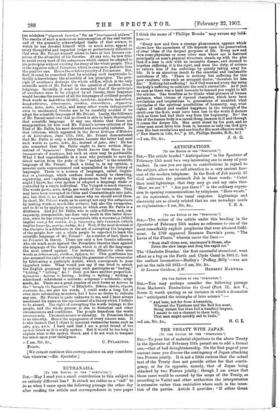EUTHANASIA.
[To TRZ EDITOR OP TUB "SPECTATOR.") Slit,—May I send you a small contribution to this subject in an entirely different line ? It struck me rather as a "call" to do so when I came upon the following passage the other day after reading the article and correspondence in your paper
I think the name of "Phillips Brooks" may excuse my bold. ness :—
" Every now and then a strange phenomenon appears which shows how the sacredness of life depends upon the preservation of clear ideas of the deepest purposes of life. Every now and then some physician or some other man whose eye is fastened principally on man's physical structure stands up with the plea that if a man is sick with an incurable disease, and doomed to hopeless suffering, it is the right, and even the duty, of science to relieve him of his sufferings by quietly taking away his life. It is an atrocious insult to the essential and inalienable sacredness of life. 'There is nothing but suffering for this poor creature,' cries such an arrogant doctor, therefore let him die ! ' Nothing but suffering ! As if God were not every day using the body's suffering to cultivate the soul's eternal life. As if just as soon as there was a hard lesson to be learned you ought to kill the scholar. One trembles as he thinks what pictures of human patience, what visions of ripened character, which have been revelations and inspirations to generations of mankind, what spectacles of the spiritual possibilities of humanity, nay, what sights of refined and exalted happiness in the triumph of the spirit over the flesh, must have been lost to the world if doctors such as these had had their way from the beginning. No! the life of the human body is a sacred thing, because in it and through it comes the deeper life. Man must stand by his post, and no other man must drive him from it, because so only can God give man His best revelations and use him for His most effective work." ("New Starts in Life, &c.," p. 121, Phillips Brooks, D.D., &c.)










































 Previous page
Previous page